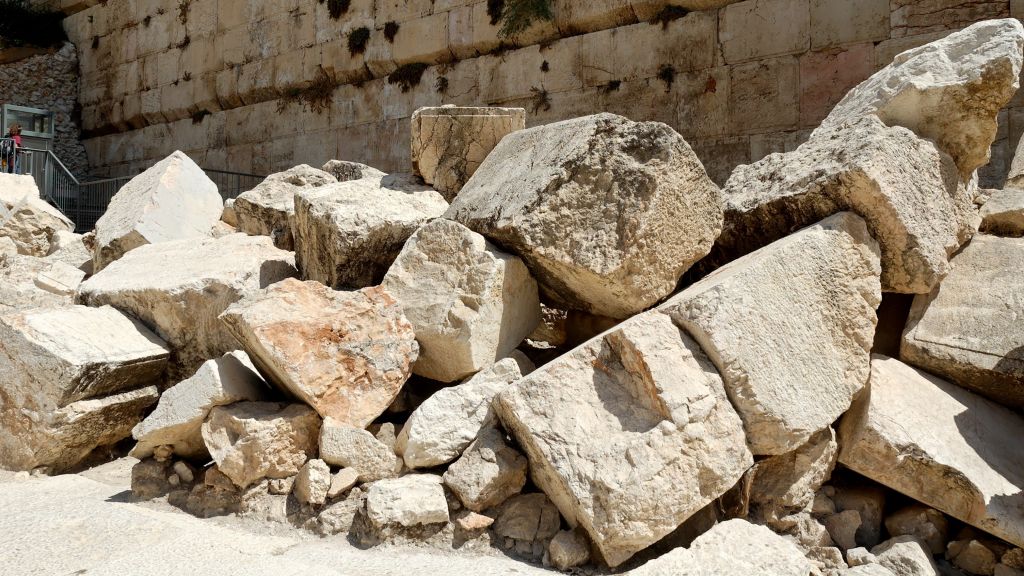A student asked us: “I would like to ask a question based on Matthew 24:36 — as to the exact day and hour of Jesus’ second advent, ‘no one knows, not even the angels of heaven, but the Father only’. We are not surprised that angels do not know. But a definite difficulty presents itself in the statement that the Son does not know the time of His own second coming to earth. Since Jesus is God, and since God knows everything, how can He fail to know? (the time)” (Stephen B.)
Answer given by pastor Christian Salcianu,
26th July 2023, Watford
Your observations are valid, making complete sense and rightly claiming an explanation. I will share my views taken from the Scriptures.
First of all, the context
Jesus walks around the temple with His disciples. They are proud of this building and ask for Jesus’ feedback (see also in the other Gospels, Mark 13, especially Luke 21:5).
Mind you, earlier that week and also during Jesus’ last speeches, in acts and teachings, He had lamented over the fate of Jerusalem. See Matthew 20, the parable of vineyard workers (Jews) who presumptuously claimed priority over other nations; similarly in chapter 21, when another parable with vineyard workers turns out bad for the Jews. Then, in Matthew 21, we find key events like the cleansing of the temple, the cursing of the fig tree (as a symbol of that nation). Chapter 22 shows disputes with all the main religious parties (evidently, their being on the wrong side of the truth). And chapter 23 continues with woes to those claiming to tell the truth (Pharisees, scribes). It ends with the terrible cry over Jerusalem’s fate (23:37-38).
Jesus tells them about ‘a house desolate…’

So, imagine the disciples surely being perplexed about the paradox: in their view the temple is amazing and yet Jesus talks about it becoming desolate.
How can that be?
Jesus’ firm position
And then, when Jesus tells them frankly that ‘not one stone here will be left on another’ (24:2) that is absolutely incredible for the apostles. In their minds, most probably, such a state of things can only take place at (simultaneously with) the end of the world. (Imagine telling it to someone in New York on 9/10 that in 24 hours the World Trade Center buildings will be levelled…)

Can you see then why they are asking this double-layered question?
‘Tell us, when will this happen and what will be the sign of your coming and of the end of the age?’
(Matthew 24:3)
Reviewing their position: (1) They believe it will happen, (2) they are keen to know the sign, and (3) they seem to know/imply that it can only take place ‘when’ Jesus’ second coming takes place which is the same as the end of the age.
Now, Jesus knows that it will not be so. (We know also, historically, in hindsight…) In fact, there are now two millennia between the two events. He is going to tell them about different events, circumstances, what we call ‘signs of the times’, basically blending events related to the fate of the city with events of much greater scope, related to the end of the world.
Then He comes with the famous sentence: ‘Truly I tell you, this generation will certainly not pass away until all these things have happened’ (24:34). As in preparation for the question that hovers in their mind (and ours), can you see how sure He is here about time?
Learning from Jesus about… ‘a generation’, they probably believed it will all finish in several decades (a generation = 40 years, see Numbers 14:16-35). The destruction of Jerusalem took place, believe it or not, in that generation, year 70. But not the end of the world! Imagine a disciple like John, writing his Gospel and the book of Revelation much later, towards the end of the century, definitely some decades after the destruction of Jerusalem.
The end of Jerusalem is not the same with the end of the world
Point is, we need to clearly cut the descriptions (and assumptions) regarding the fate of the city and the ones related to the fate of the earth. That is a very good exercise for you, as a Bible student. And I invite you to study in parallel Matthew 24, Mark 13, and Luke 21 (other connections can be found in Luke 17). However, make sure you do not dissociate them completely, since Jesus blended them. Some descriptions may easily have application for both that time and the time of the end (for example persecution, false prophets etc.).

To make all things sure, Jesus continues in verse 35: ‘Heaven and earth will pass away, but my words will never pass away.’ In other words, all this is going to take place as prophesied.
With this in mind, we are ready then to read verse 36… Are we?
Who knows the time of the end?
‘But about that day or hour no one knows, not even the angels in heaven, nor the Son, but only the Father.’
(Matthew 24:36)
We do have two issues on the table: the end of Jerusalem and the end of the world. For one (Jerusalem), Jesus says it will all happen in one generation, and it did. He knew and could say the right time about it, confirmed in history. As for the other one (end of the world), that is a different story. And that’s where we are told ‘no one knows the day or the hour’.
No one? As you say, some creatures may not know, whether they are humans, angels… But what about the Son of God? (Mind you, why not talk about the fact that the Father knows all things and be content with that?)
Jesus’ own limitations
You are right in saying that Jesus was divine. He showed that by doing miracles, raising the dead, knowing the future, being able to read hearts and minds, forgiving sins etc. And yet, we need to make sure we have a greater (or a deeper) perspective.
When Jesus came on earth, He assumed some limitations. Remember, He was the baby in Bethlehem, needing to learn how to walk, how to talk. Later we find Him as an adult man and the Gospels report of Him of being tired, suffering from hunger (temptations in the wilderness), from thirst (Samaria), from sleep deprivation (in the boat). You can find all these things in the Bible and they are not hidden or avoided at all. It means that the disciples perceived Him as fully man and fully God.
In the end He accepted being bound for arrest, suffering torture, being crucified and put to death.

These are hard truths to be reconciled with the idea of being divine and having power to defy, resist and conquer all by power. My point, once again, is that Jesus assumed limitations. Read Philippians 2:5-11 and see for yourself.
‘He made himself nothing by taking the very nature of a servant, being made in human likeness. And being found in appearance as a man, he humbled himself by becoming obedient to death—even death on a cross!’
(Philippians 2:7-8)
In His human body He surely had limitations that we may not fully comprehend. For example, did He know what the next day will bring or was it all a discovery step by step through the leading of the Holy Spirit? How did He blend the human and divine nature? How could He say the Father left Him alone since they were one? What happened with his divine nature when He died? Of course, some of these questions may seem very foolish… so I prefer to not go there, but stay at what was written and try to understand that. We all grow in knowledge, even the knowledge to accept our own limitations.
May I then propose that
(a) in His human body and mind the Father hadn’t disclosed all things to Jesus. To give one example, think of His plea with the Father about the possibility to take the cup away from Him (Matthew 26:39).
(b) Jesus’ stance is one of a servant (remember Philippians 2), obeying a master plan of the Father, no matter how or when that will take place. And that becomes the ultimate example for us, even for such a question as this.
(c) for human observers not all things fit into what we believe or expect to be the Father-Son relationship. To give an example of Jesus saying things in a manner so that we understand better, but not necessarily as they are between Him and the Father, please read John 11:41.
(d) in His human body He was not in the position to tell everything. I am not implying being ‘unable to say’ or ‘unable to know’. There were things He could say and things He preferred not to say (see Matthew 21:27). Even to John the Baptist He did not disclose the full reasoning for His own baptism. In our context the disciples were completely unprepared to grasp more than it was revealed to them (see also John 16:12).
P.S. Question reloaded
In the end I would rather go to the book of Acts where, after the resurrection, the disciples are inquiring about it again. As said, they are still unprepared and yet they act like they enjoy full knowledge: ‘Lord, are you at this time going to restore the kingdom?’ (Acts 1:6). They seem to not get the future at all since, for example, in a few moments the Lord will be taken from them.
Jesus’ response is eye-opening (verses 7-8):
‘It is not for you to know the times or dates the Father has set by his own authority. But you will receive power when the Holy Spirit comes on you; and you will be my witnesses in Jerusalem, and in all Judea and Samaria, and to the ends of the earth.’
(Acts 1:7-8)
I see two key elements:
(1) it is not for me to know the times or dates. It is not my business, and I should not inquire, speculate, press upon etc. about this issue. They are all under the Father’s authority and that is sufficient for me. May I invite you to do the same?
(2) There are other things in my power: get ready for the Holy Spirit to come in my life, be a witness for Jesus everywhere, keep sharing the Gospel to the end. I hope we have just been doing that in our conversation and mutual spiritual growth.




